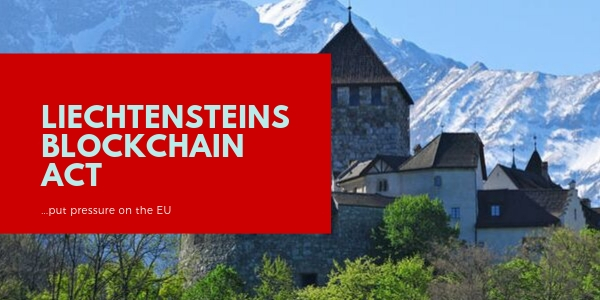Liechtensteins Blockchain Act put pressure on EU
News provided by Articlesnetwork Ltd. on Monday 7th Oct 2019
For investors like the Blockchain investment company Blokkx Ltd., there is now an opportunity to use regulatory frameworks for investment security.
The Liechtenstein Parliament has just passed the Blockchain Act.
The new Blockchain Act is intended to provide an ideal framework for the blockchain industry and to promote Liechtenstein as a pioneer in blockchain regulation. What is unique about the Blockchain Act, what those responsible say about it, and why the Act has a vital signal function for the whole of Europe are outlined below.Liechtenstein is known for its crypto-friendly regulation and is therefore popular with many blockchain start-ups. Now a comprehensive legal basis has been set with the so-called Blockchain Act. This Act creates more legal clarity, especially in the area of the token economy and tokenization. Which is also represented in the official name of the Blockchain Act: the Token and VT Service Provider Act or TVTG for short.
What the people of Liechtenstein say about the Blockchain Act
Mauro Casellini, CEO of Bitcoin Suisse (Liechtenstein) AG and one of those who played an active role in helping making Liechtenstein a crypto-friendly country, stated:
The favourable decision without a dissenting vote by the Liechtenstein government shows the importance attributed to the "Blockchain Act". The TVTG not only creates legal certainty for all the market participants but also heralds a new era: the token economy. Liechtenstein's pioneering role once again proves that it is the ideal location for FinTech and Blockchain companies and thus also for us, in the heart of Europe.
The legal development of the Blockchain Act can be traced back to Thomas Nägele and his law firm. Nägele played a decisive role in the token regulation. Nägele emphasizes this to BTC-ECHO:
With the "Blockchain Law"/TVTG, Liechtenstein offers s legal basis for the token economy, and this law has already attracted worldwide attention. It would be desirable if the core concept – the "Token Container Model" – were to be also adopted in other countries.
The Token Container Model (TCM)
In the token container model, the token serves as a container for all kinds of rights, whether shares, real estate or license rights. Thus, a token transfer is also coordinated with civil law, so that a token transaction from A to B is fully legally defined. This holistic approach is, so far, unique in Europe.
Prof. Dr Philipp Sandner from the Blockchain Center of the Frankfurt School of Finance shares the opinion that the law, when it comes into force next year, will also have a signal function for other countries:
So far, the full details of the Liechtenstein Blockchain Act are not yet known, and most of the implications are not yet fully understood. But if the law comes into force in January 2020 and as the opportunities are increasingly recognized, Liechtenstein could become a real enabler of the token economy. Virtually every right and every asset can be tokenized from January – without the more or less complicated legal "workarounds" that are required in other countries.
Growing pressure on Germany and other EU countries
Even though Liechtenstein is only a tiny country, its legislation can have a significant influence on further blockchain regulation in the EU. While there are a few exciting crypto start-ups in Liechtenstein, such as Aeternity or the crypto investment fund INVAO, Liechtenstein is also a member of the European Economic Area (EEA), which make it a highly desirable loaction for crypto business. In contrast to Switzerland, which is not a member of the EEA, licenses and blockchain service offerings in Liechenstein can be transferred or passported to Germany and other countries much easier.
Germany, in particular, could take the Blockchain Act as an opportunity to pursue its own recently adopted blockchain strategy resolutely. Indeed, while Germany cannot keep up with the speed of Liechtenstein, with its greater influence in Europe, it can push ahead the standardization and establishment of tokenization more resolutely.
Investors welcome growing regulations
For investors, like the blockchain investment company Blokkx Ltd, there is now an opportunity to use regulatory frameworks for investment security. Through regulation and the growing visibility, blockchain is becoming more and more visible to the public. According to Blokkx Ltd, any regulation is welcome. The applications are only at the beginning, but blockchain has the potential to trigger the next technical disruption. But also for investors in blockchain start-ups, regulatory frameworks offer better transparency and security. Blokkx Ltd will issue a bond before the end of this year, which will be used for further investments, such as the "Spreatz Coin". The development of the "Spreatz Coin" is still in its infancy and is based on so-called "Bluechip Crypto Baskets" as a basis to carry out secure arbitrage trades with technology based on the development of leading universities, like ETH Zurich (ethz.com) or Cornell University (cornell.edu).
Santander Bank also announced in September that it had placed its first bond for over 20 million euros. See press release: (http://bit.ly/2Vgmj6Q)
Press release distributed by Pressat on behalf of Articlesnetwork Ltd. , on Monday 7 October, 2019. For more information subscribe and follow https://pressat.co.uk/
Blockchain Regulation Blockchain Investment Blokkx Ltd. Crypto Currency
You just read:
Liechtensteins Blockchain Act put pressure on EU
News from this source:



